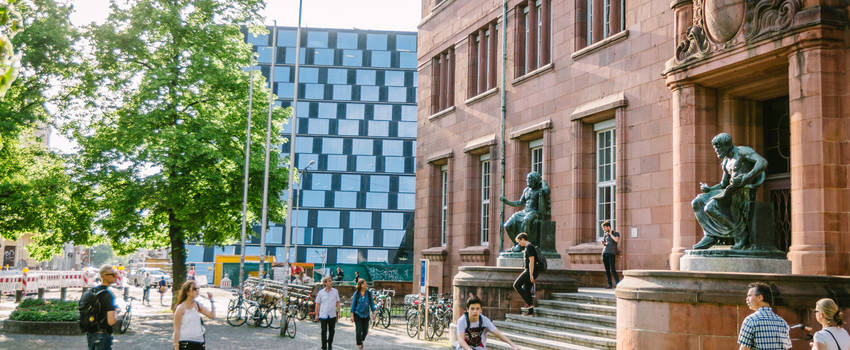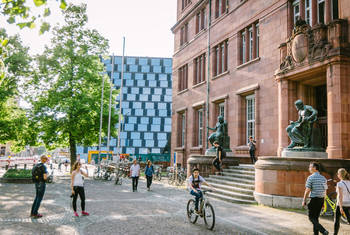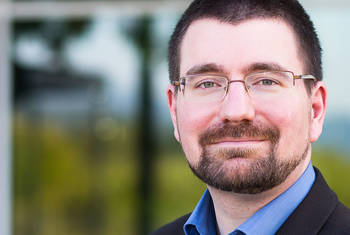Lena Henningsen What Explains the Impact of Popular Chinese Fiction from the Period After the Foundation of the PRC?
Lena Henningsen is Junior Professor at the Institute of Chinese Studies at the Albert-Ludwigs-Univerity Freiburg. She received her PhD from Ruprecht-Karls-University Heidelberg where she was a member of the excellency cluster „Asia and Europe in a Global Context“. Henningsen’s research interests are Chinese literature from the 20th and 21st century, popular culture as well as imitation and plagiarism in China. She received a Brigitte-Schlieben-Lange-Grant for excellet female junior researchers with children and won the Young Scholar Award of he European Association of Chinese Studies. She is a member of the Young Academy at the Berlin-Brandenburg Academy of Sciences and Humanities and the National Academy of Sciences Leopoldina. She participates in Fast Track: Excellence and Leadership Skills for Outstanding Women in Science by the Robert-Bosch-Stiftung. Lena Henningsen is Junior Professor at the Institute of Chinese Studies at the Albert-Ludwigs-Univerity Freiburg. She received her PhD from Ruprecht-Karls-University Heidelberg where she was a member of the excellency cluster „Asia and Europe in a Global Context“. Henningsen’s research interests are Chinese literature from the 20th and 21st century, popular culture as well as imitation and plagiarism in China. She received a Brigitte-Schlieben-Lange-Grant for excellet female junior researchers with children and won the Young Scholar Award of he European Association of Chinese Studies. She is a member of the Young Academy at the Berlin-Brandenburg Academy of Sciences and Humanities and the National Academy of Sciences Leopoldina. She participates in Fast Track: Excellence and Leadership Skills for Outstanding Women in Science by the Robert-Bosch-Stiftung.
Area of Research
Popular Chinese Literature (20th, 21st centuries), Contemporary China: Society, Popular Culture, Consumer Culture, Intellectual Property, Creativity, Imitation and Plagiarism in China, Chinese Music
since 2012
Junior Professor for Chinese Studies
Albert Ludwigs University of Freiburg (Albert-Ludwigs-Universität Freiburg) (more details)
2004-2012
Assistant Professor
Heidelberg University (Ruprecht-Karls-Universität Heidelberg)
Institute of Chinese Studies
2008-2009
Project Coordinator “Rethinking Trends”, Cluster of Excellency “Asia and Europe”
Heidelberg University (Ruprecht-Karls-Universität Heidelberg)
2008-2009
Postdoctoral Researcher and Project Coordinator “Creative Dissonances”, Cluster of Excellency “Asia and Europe”
Heidelberg University (Ruprecht-Karls-Universität Heidelberg)
2003-2004
Teaching, Library and Research Assistant
Heidelberg University (Ruprecht-Karls-Universität Heidelberg)
Institute of Chinese Studies
2008
PhD in Chinese Studies
Heidelberg University (Ruprecht-Karls-Universität Heidelberg)
2004
Master in Chinese Studies, Musicology, Political Sciences
Heidelberg University (Ruprecht-Karls-Universität Heidelberg)
After Studies in Berlin (Humboldt-Universität zu Berlin, Free University) and Nanjing (Nanjing Normal University PR China)
- MCLC (Modern Chinese Literature and Culture)
- Asiatische Studien / Études asiatiques
- Archiv Orientalni
- Chime
- Plagiary
Fellowships
- Fast-Track Programm of the Robert Bosch Stiftung (2014-2016)
- Member of the Young Academy (Junge Akademie an der Berlin-Brandenburgischen Akademie der Wissenschaften und der Deutschen Akademie der Naturforscher Leopoldina) (2013-2018)
- Brigitte Schlieben-Lange Scholarship (2011-2012)
- Scholarship of the DAAD for studies at Nanjing Normal University (2000-2001)
- Scholarship of the Studienstiftung des deutschen Volkes, 2003 Scholarship for Field Trip to Shanghai, Wuxi, Nanjing und Beijing (2000-2004)
Prizes
- European Association for Chinese Studies’ Young Scholar Award for the Paper “No Faith in Fakes: Han Han on Plagiarism and Authenticity in the Contemporary Chinese Literary Field” (2008)
- Winner of „Geist begeistert“ (Bundesweiter Universitätswettbewerb des BMBF) for the Project „Cooperation with Schools“ (2007)
- Conference Grant „Imaginary Food: Eating and Representation in Contemporary Culture” (Granted by the Young Academy, with Colleagues) (2016)
- Research Grant „Worlds of Reading“ (Granted by the Ministry of Science, Research and Arts, Baden-Württemberg) (2015-2018)
- Conference Grant „To Boldly go Where no Man has Gone Before: The Fascination of the Unknown: Time” (Granted by the Young Academy, with Colleagues) (2015)
- Conference Grant „Schreiben, Lesen, Hören: Rezeption und Autorschaft in Populärkulturen“ (Granted by the Young Academy, with Colleagues) (2015)
- Conference Grant „To Boldly go Where no Man has Gone Before: Die Faszination des Unbekannten: Raum” (Granted by the Young Academy, with Colleagues) (2014)
- Project Grant „China‘s Transformationen“ (Granted by Innovationsfond Forschung of Freiburg University, with Colleagues) (2012-2013)
- Project Grant “Rethinking Trends” (Granted by the Cluster of Excellency “Asia and Europe”, Heidelberg University, with Colleagues) (2008, 2009)
- Project Grant „Cooperation with Schools“ (Granted by Robert Bosch Stiftung) (2008)
 © Sandra Meyndt/University of Freiburg
© Sandra Meyndt/University of Freiburg

Albert Ludwigs University of Freiburg (Albert-Ludwigs-Universität Freiburg)
Founded in the 15th century, the University of Freiburg has a long-standing reputation of excellence in academic teaching and research. Among the most renowned university members were the philosophers Edmund Husserl and Martin Heidegger, the economist Walter Eucken, and such Nobel Prize winners as Hans Spemann, Hermann Staudinger, Georg von Hevesy, Friedrich August von Hayek and George Köhler. Today, with its mixture of traditional subjects and modern technology, the University of Freiburg is flourishing more than ever. The university and its hospital employ more than 19,000 staff members. Organized according to the classical model of a comprehensive university, it provides 25,000 students with a broad range of subjects – from applied information technology, the entire spectrum of medical specialities and natural sciences to the fields of humanities and social sciences. Freiburg’s research and teaching policies aim to overcome the barriers between individual disciplines to create opportunities for new perspectives on complex problems. By supporting collaborative research projects across boundaries and implementing centers of knowledge and interdisciplinary graduate colleges, the university provides the disciplines an effective means by which to benefit from each other’s knowledge.
An added benefit that comes with such flexibility is an increased international interest for our university: We are pleased to have a significant number of scientists and students from all over the world, whose culture-specific views of scientific procedures and research approaches enrich the dialog with their German counterparts. 16% of the student body are from foreign countries. The general international exchange of scientific results and experiences also plays an important role at the University of Freiburg. More than 300 partner universities and programs on five continents, together with the alumni association, form a first-class international network. (Source: University of Freiburg)
Faculty
Institute of Chinese Studies (Institut für Sinologie)
"Research and teaching at the Institute of Chinese Studies at Freiburg University focus on modern and contemporary China and are characterized by an interdisciplinary approach combining history and the social sciences.
In addition, the Institute offers a comprehensive training in the Chinese language.
Research at the Institute deals with a wide range of aspects concerning modern China, including Chinese politics, economy, society, culture and history.
Both in research and teaching, the Institute cooperates with China experts in the fields of history, law, sociology, medicine and psychology at Freiburg University.
We train students for occupations with a focus on China, play an active part in the international research on China and inform the public about current developments in China." (Source)
Map
Certain fictional texts written during the seventeen years after the foundation of the People’s Republic of China (PRC) and before the Cultural Revolution are seen as influential and popular over time. In her research project presented in this video LENA HENNINGSEN investigates which factors lead to said popularity, which normative elements are contained in the texts and how they are constructed. She explains how descriptions of everyday actions of the protagonists are codes for underlying normative values and thus provide insights about the early years of the PRC.
LT Video Publication DOI: https://doi.org/10.21036/LTPUB10078
Tastes of Revolution, Change and Love: Codes of Consumption in Fiction from New China
- Lena Henningsen
- Frontiers of Literary Studies in China
- Published in 2014









